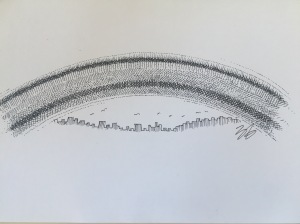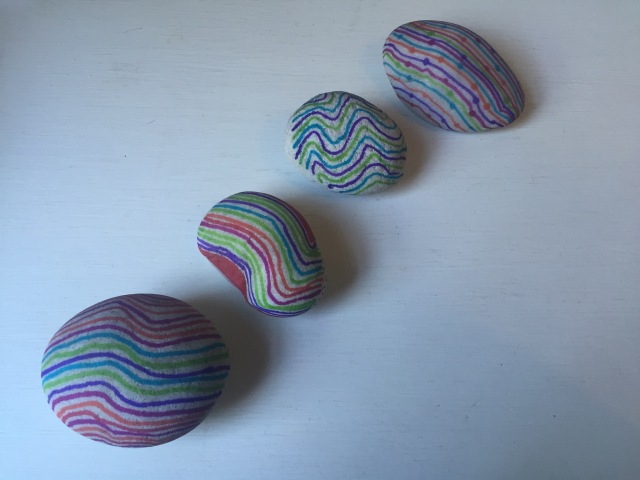
One day, in 2010 when our son Kai* was in Grade 1 after he had finished the ‘work’ or ‘task’ assigned to him by his teacher he asked for a piece of paper to draw on. This is a daily standard practice in (some) schools – when the child has finished the work they need to do they get to do something else…like draw or read or play with blocks etc. It is one of the earliest, simplest ways we as teachers create a binary in the class between what is work- that has been sanctioned by the state, the curriculum, the school which COUNTS and then what the children do which is not assessed, valued or recognized as work -usually the drawing, talking or playing. I am making some sweeping generalizations but I am using these assumptions to illustrate a point.
Kai was given a piece of paper ( or went to collect it from the box called scrap paper) and started to draw Hiccup from How to train your dragon, he then asked for another piece of paper which he glued to the first piece and then proceeded to draw Toothless, the dragon, and then when that page was full he asked for a third piece of paper, and when that was full, a fourth and all these were glued under each other, and then went to the top of the page and added another piece of paper to the left of Hiccup. When he came home that afternoon he was very pleased and continued to work on the piece. It ended up being 3 A4 pieces across and 4 A4 pieces down.
Kai’s teacher aide in Grade 1, a close friend to this day, Lisa Harrison, told me she watched him and he would draw until he got to the edge of the page and then paste the next page and then carry on going – he had a vision of what it is he wanted to complete, the process was important too – he did not paste 12 pages together and then start drawing, he drew until he had no paper left and then kept going. If you see the one he started with there is more ‘detail’ in that part as he did the 5 pages at school and also had used different colouring pencils, to the ones he used on the next 7 sheets. (The content of the scrap paper will be the material for another blog – it is fascinating what it on the reverse of the drawing).
Fast forward to July 2016, almost exactly 7 years later and I had the privilege of attending the Reggio Africa Area Alliance conference at UCT, where Tiziana Filippini was one of the guest speakers. In one of her two illuminating lectures she spoke about the materials we give children and how it matters that we end up giving them the same size paper, the same colour paper, the same colours of pencil crayons etc…or not give them but make available to them all the time. She explained that their thinking/drawing/feeling changes depending on the size of the paper for example and this reminded me of the drawing Kai had done. I too have been guilty of giving and storing only one size of scrap paper in my classroom – when I was a classroom teacher and usually it was white. I am not saying that the child who wants to draw will only use the paper in the size it is given – many children do what Kai did – they join pieces together, they cut them up and are very creative with the materials they are provided with. The irony is, is that sometimes as teachers we are so stuck in the sameness of what we provide, what is on offer, what we make available and acceptable in our classrooms. There is also a tremendous amount of policing of the resources that children use in some classrooms – so we tell children not to “waste paper” and not to “waste time”. B ut we don’t acknowledge when we are “wasting children”?
When Kai came home that day I knew this was the most important ‘thing’ he had done for the day – but that would not reflect on his report or any of the other ways schools believe they need to measure success at school. This reminded me about what we value in our classrooms – is it what the children do after we are finished ‘teaching’ them: We need to value who they are talking to and what they are talking about, the great plans they are making, the thinking, the laughing, the staring into space or the staring into the world, the planning required to meet somewhere for lunch, to play a game, to sit together. There is so much we don’t value that is happening all day, every day in schools- which is not reflected in the curriculum or in the planning or on their reports.
So -let’s start evaluating how we refer to what we are doing in class and what is valued by everyone and everything in it. I challenge you – teachers/ parents/ caregivers/ change the size of the paper available – tear little scraps and if they need something to draw on give them the little scrap or just leave the pritt or sellotape out – we know that children are inherently creative and yearning for ways to express what they know, what they love, what they want to be doing – but if the ‘rotatrim’ lid or box contains the scrap paper they’ve been using for the year then shake things up!
I remain cognisant that for many children paper is a luxury and am grateful that we use and reuse paper as scrap paper. I think we need to relook at the assumptions that are presented to our children not just through the delivery of the curriculum, in our teaching but also in the materials in our classes.
*Kai gave permission for me to use his piece for this blog.








